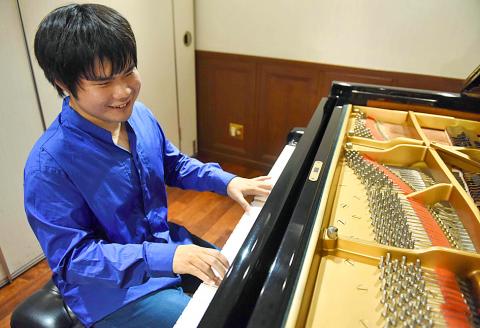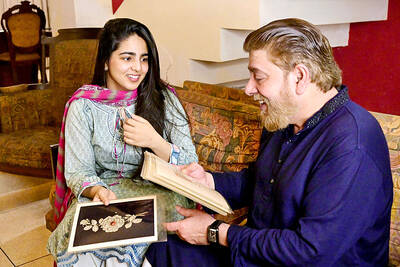Blind since birth, virtuoso Japanese pianist Nobuyuki Tsujii puts his global success down to a wide range of experiences outside music — and listening to how the conductor breathes.
“I love sport, I love swimming, skiing,” the 29-year-old said in an interview. “The more I experience, the more positive things it brings me as a musician.”
Tsujii — or “Nobu” as he is known — has risen to become a star of the international classical music scene, playing in more than 160 concerts around the world in locations such as London’s Royal Albert Hall and Carnegie Hall in New York and becoming a joint winner of the Van Cliburn gold medal.

Photo: AFP
He has played with the London Philharmonic and will be giving his first major recital in France later this month, while an elegy he wrote for the victims of the 2011 earthquake and tsunami in Japan has gotten 13 million views on YouTube.
Born in Tokyo, Tsujii’s love of music started at the age of eight months, when his mother played him a CD by Polish composer Frederic Chopin.
“I wiggled my legs in time to the music,” he said.
He began tinkling on a toy piano at the age of two and real music lessons started at four. He learned to read sheet music via Braille, but many compositions were not accessible via this method so he learned to play by ear, from memory.
“It is good at the beginning to be faithful and precise but afterwards I tried to interpret [the music] and that is very important, difficult and deep,” he said.
A very rare example of a blind pianist at such a high level, Tsujii said he is inspired by the sensations provided by nature and other art forms.
“From a very young age, my mother gave me experiences outside of music. She would take me to museums and describe the drawings or paintings she liked. She would take me to a firework display and describe the colors,” he said.
Tsujii’s main musical influence remains the “delicate, elegant, romantic” Chopin, whose patriotism he admires.
He said is he also drawn to Beethoven, Debussy and Ravel.

VENEZUELAN ACTION: Marco Rubio said that previous US interdiction efforts have not stemmed the flow of illicit drugs into the US and that ‘blowing them up’ would US President Donald Trump on Wednesday justified a lethal military strike that his administration said was carried out a day earlier against a Venezuelan gang as a necessary effort by the US to send a message to Latin American cartels. Asked why the military did not instead interdict the vessel and capture those on board, Trump said that the operation would cause drug smugglers to think twice about trying to move drugs into the US. “There was massive amounts of drugs coming into our country to kill a lot of people and everybody fully understands that,” Trump said while hosting Polish President

A French couple kept Louise, a playful black panther, in an apartment in northern France, triggering panic when she was spotted roaming nearby rooftops. The pair were were handed suspended jail sentences on Thursday for illegally keeping a wild animal, despite protesting that they saw Louise as their baby. The ruling follows a September 2019 incident when the months-old feline was seen roaming a rooftop in Armentieres after slipping out of the couple’s window. Authorities captured the panther by sedating her with anesthetic darts after she entered a home. No injuries were reported during the animal’s time on the loose. The court in the

Japan yesterday heralded the coming-of-age of Japanese Prince Hisahito with an elaborate ceremony at the Imperial Palace, where a succession crisis is brewing. The nephew of Japanese Emperor Naruhito, Hisahito received a black silk-and-lacquer crown at the ceremony, which marks the beginning of his royal adult life. “Thank you very much for bestowing the crown today at the coming-of-age ceremony,” Hisahito said. “I will fulfill my duties, being aware of my responsibilities as an adult member of the imperial family.” Although the emperor has a daughter — Princess Aiko — the 23-year-old has been sidelined by the royal family’s male-only

For more than a century, the fate of the dazzling Darya-e-Noor diamond has been sealed inside a bank vault — a mystery that haunts Khawaja Naim Murad, great-grandson of the last prince, or nawab, of Dhaka. Locked away in 1908, were the family’s heirlooms lost during the violence at the end of British rule in 1947? Did they survive Bangladesh’s war of independence in 1971 and the string of coups that followed, or are they still safe, dusty, but untouched? Many suspect that the jewels are long gone and officials at the state-run bank hesitate to simply open the vault, fearing that they